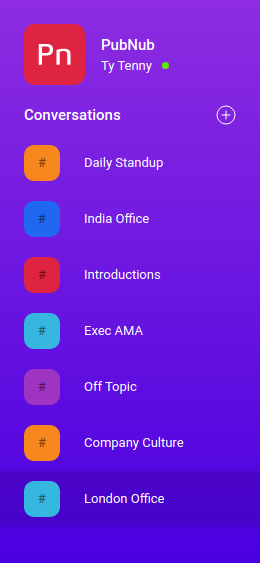Show My Conversations
Below your user info, you’ll find your list of conversations. The Introductions conversation is automatically selected when the app launches.
You can join other conversations with the + button, and leave existing conversations with the Exit button. These features are covered in the join conversation and leave conversation sections of the tutorial.

The joinedConversations/MyConversations/MyConversations.tsx component gets the user’s list of conversations and allows the user to select a conversation.
When the app loads, it selects the Introduction conversation by default.
export interface ConversationFragment {
id: string;
name: string;
}
const MyConversations = () => {
const currentUserId = useSelector(getLoggedInUserId);
const conversationsById = useSelector(getConversationsById);
const conversations: ConversationFragment[] = useSelector(
getJoinedConversations
);
const currentConversationId: string = useSelector(getCurrentConversationId);
if (conversationsById === undefined) {
return <div>Loading...</div>;
}
return (
<Wrapper>
<Title>
Conversations
</Title>
<ConversationList>
{conversations.map(conversation => (
<ConversationItem
id={conversation.id}
name={conversation.name}
selected={conversation.id === currentConversationId}
key={conversation.id}
onClick={() => {
dispatch(focusOnConversation(conversation.id));
dispatch(setLayoutDefault());
}}
></ConversationItem>
))}
</ConversationList>
</Wrapper>
);
};
Get Conversations for User
The MyConversations component calls the getConversationsByUserId() selector to get the user’s conversations from the local store. This selector returns the list of conversations, along with properties like id and name, to be displayed in the UI.
export const getJoinedConversations = createSelector(
[getConversationsById, getLoggedInUserId, getConversationsByUserId],
(
conversations: ConversationsIndexedById,
userId: string,
userConversations: MembershipHash
): ConversationFragment[] => {
return userConversations[userId]
? userConversations[userId].map(conversation => {
return {
id: conversation.id,
name: conversations[conversation.id].name
};
})
: [];
}
);
